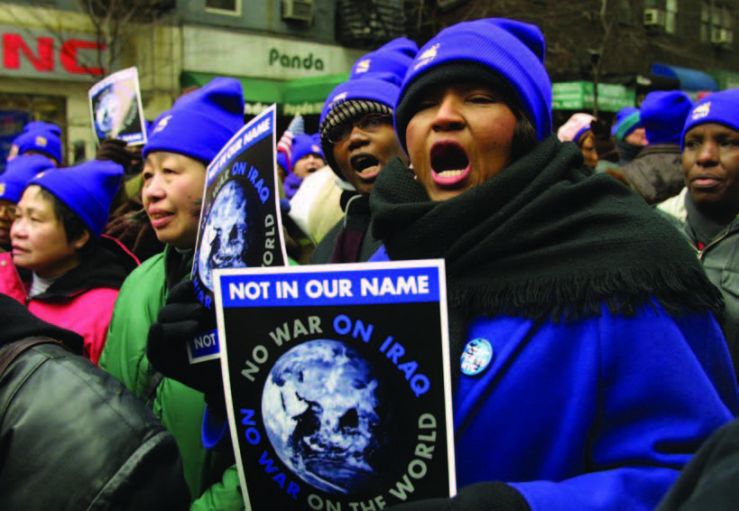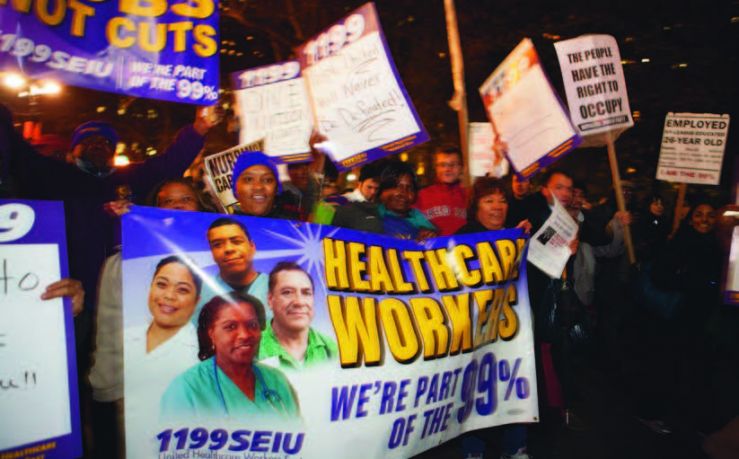The Right Side of History
September 5, 2024
1199ners have long championed the cause of peace and justice around the world.

The stance was unpopular in many circles, but it was consistent with 1199’s opposition to unjust wars and its commitment to solidarity. Just as racial equality was a guiding principle of the Union, so were peace and justice. In subsequent years, other unions followed suit.
In the 1980s, members joined forces with other unions including the autoworkers, longshoremen, AFSCME (American Federation of State, County and Municipal Employees) and UAW (United Auto Workers) District 65 to build support against South African apartheid.
Some three thousand 1199ers joined an April 25, 1987 Washington, D.C. rally to protest then-President Ronald Reagan’s policies in South Africa, as well as Central America. In all, some 100,000 marchers participated in the action. This despite calls from the AFL-CIO leadership to boycott the protest.
In 1990, 1199 President Dennis Rivera joined a delegation that traveled to South Africa to mark the historic release of anti-apartheid leader Nelson Mandela from prison.
In 1996, Beth Israel RN and delegate Marilyn Albert volunteered for six months to work with sister South African union— NEHAWU—the National Education, Health and Allied Workers Union. She wrote three reports, published in 1199 News, sharing her experiences and drawing lessons for 1199ers.
Throughout 2001, 1199ers took part in protests to halt the U.S. Navy shelling of the Puerto Rican island of Vieques. The actions included hundreds of 1199ers and supporters marching in the New York City Puerto Rican Day parade under the banner “Paz Para Vieques” (“Peace for Vieques”).
For some 60 years, the US Navy had used Vieques as a training ground for war, pounding the island with bombs, napalm, depleted uranium, and other toxic chemicals and heavy metals.
Later that same year, 1199 President Dennis Rivera, Robert F. Kennedy, Jr., Rev. Al Sharpton and Jacqueline Jackson—wife of the Rev. Jesse Jackson—were all arrested in Vieques for protesting the ongoing destruction. Rivera and Kennedy both served 30-day jail sentences on the island for their actions.
Those actions were successful, however. Then-President George W. Bush ultimately ended the Navy bombing and maneuvers in 2003. Federal cleanup efforts continue to this day, but substantial work remains as residents of Vieques continue to suffer from diseases caused by widespread contamination.

In 2011, the Union stood shoulder-to-shoulder with the Occupy Wall Street activists who were protesting rampant economic inequality and corporate dominance. The 1199 leadership saw the movement as a landmark in the fight for justice.
“I was very moved when 1199SEIU mobilized for the Nov. 17, rally at Foley Square and helped lead the march over the Brooklyn Bridge” said Mike Haire, an 1199 delegate at Staten Island’s Richmond University Medical Center. “I was proud to see 1199ers, led by President George Gresham, get arrested for their acts of civil disobedience.”
In 2013, Union leaders and staff were again arrested for civil disobedience. The venue was Raleigh, North Carolina, during Moral Monday protests led by Rev. Dr. William J. Barber and the Rev. Liz Theoharis. The campaign, which continues today (see We are the Swing Voters, p. 14), is fashioned after the 1968 Poor People’s Campaign led by Dr. Martin Luther King, Jr. just weeks before his assassination. To date, the movement has mobilized thousands of grassroots events.
1199 retiree Clifton Broady, a resident of Rockingham, N.C., is among the 1199ers who have worked with the campaign. At a 2013 event, Broady condemned North Carolina’s anti-union rightto-work law, stating, “All that means is the workers have no rights.”
In recent years, 1199ers have formed peace and justice committees that help to educate members and influence union policies in support of vital issues, including immigrant rights and the global struggle for climate justice. These are consistent with the Union’s mission to protect and advance the interests of members, their families, communities, and those that they serve.

